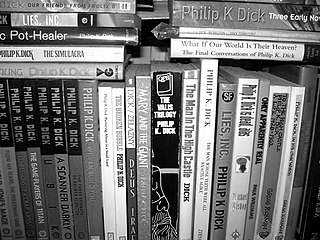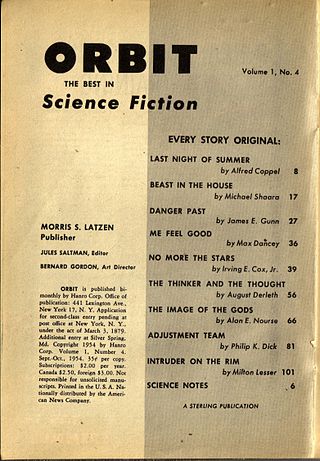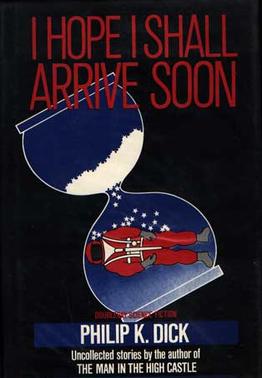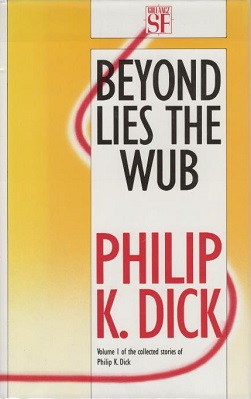External links
| | This article about a science fiction short story (or stories) published in the 1950s is a stub. You can help Wikipedia by expanding it. |
| "The Short Happy Life of the Brown Oxford" | |
|---|---|
| Short story by Philip K. Dick | |
| Language | English |
| Publication | |
| Published in | The Magazine of Fantasy & Science Fiction |
| Publication type | Magazine |
| Publisher | Fantasy House, Inc. |
| Publication date | January, 1954 |
"The Short Happy Life of the Brown Oxford " is a science fiction short story by American writer Philip K. Dick, first published in the January, 1954 edition of The Magazine of Fantasy & Science Fiction and later in Beyond Lies the Wub in 1984 and in The Short Happy Life of the Brown Oxford , a collection of Philip K. Dick short stories, in 1990.
The story is told from a first person perspective of a young man and his friend, a scientist named Doc Rupert Labyrinth (also appearing in Dick's short story "The Preserving Machine"), who develops a new device called The Animator, which gives life to otherwise inanimate objects. Doc thinks that the machine does not work, and sells it to the narrator for 5 dollars. The narrator leaves his shoe in the machine, and discovers the following day that the shoe has become alive. Doc and the narrator catch the shoe and stuff it in a drawer, while Doc returns to the university to get his fellow professors to witness the shoe. Meanwhile, the narrator loses the shoe, as it escapes and leaves the house. Shortly later, the shoe returns and uses the Animator to animate a woman's shoe for companionship, and when Doc and his fellow professors, and the press, return, they witness the two shoes, moving across the lawn, disappearing into a hedge.

Philip Kindred Dick, often referred to by his initials PKD, was an American science fiction writer and novelist. He wrote 44 novels and about 121 short stories, most of which appeared in science fiction magazines during his lifetime. His fiction explored varied philosophical and social questions such as the nature of reality, perception, human nature, and identity, and commonly featured characters struggling against elements such as alternate realities, illusory environments, monopolistic corporations, drug abuse, authoritarian governments, and altered states of consciousness. He is considered one of the most important figures in 20th-century science fiction.
"We Can Remember It for You Wholesale" is a science fiction novelette by American writer Philip K. Dick, first published in The Magazine of Fantasy & Science Fiction in April 1966. It features a melding of reality, false memory, and real memory. The story was adapted into the 1990 film Total Recall with Arnold Schwarzenegger as the story's protagonist; that film was remade in 2012 with Colin Farrell as the protagonist.
"The Variable Man" is a science fiction novella by American writer Philip K. Dick, which he wrote and sold before he had an agent. It was first published in the British magazine Space Science Fiction Vol. 2 No. 2, July 1953, and in the American version on September 1953, with the US publication illustrated by Alex Ebel. Despite the magazine cover dates it is unclear whether the first publication was in the UK or in the United States where magazines tended to be published farther ahead of their cover dates than in the UK. The Variable Man can be found in several collections of Dick's short stories, including The Variable Man and The Short Happy Life of the Brown Oxford.
"The Dead Past" is a science fiction short story by American writer Isaac Asimov, first published in the April 1956 issue of Astounding Science Fiction. It was later collected in Earth Is Room Enough (1957) and The Best of Isaac Asimov (1973), and adapted into an episode of the science-fiction television series Out of the Unknown. Its pattern is that of dystopian fiction, but of a subtly nuanced flavor.
"Exhibit Piece" is a 1954 science fiction short story by American writer Philip K. Dick. The story is an early exploration of the concept of shifting realities, a common theme in Dick's subsequent works. The protagonist is a future historian of the 20th century who finds himself shifting in time from the future to that time period. At first, it is unclear whether he is merely a man from the past imagining a future life, or vice versa.
"Breakfast at Twilight" is a science fiction short story by American writer Philip K. Dick. It was received by the Scott Meredith Literary Agency on January 17, 1953 and first published in Amazing Stories, July 1954. It appears in the second volume reprint of Philip K. Dick's short stories Second Variety.
"Roog" is a science fiction short story by American writer Philip K. Dick. It was his first sold work, although not his first published story.

The bibliography of Philip K. Dick includes 44 novels, 121 short stories, and 14 short story collections published by American science fiction author Philip K. Dick during his lifetime.

"Adjustment Team" is a science fiction short story by American writer Philip K. Dick. It was first published in Orbit Science Fiction with illustration by Faragasso. It was later reprinted in The Sands of Mars and Other Stories (Australian) in 1958, The Book of Philip K. Dick in 1973, The Turning Wheel and Other Stories in 1977, The Collected Stories of Philip K. Dick in 1987 (Underwood–Miller), 1988, 1990, Selected Stories of Philip K. Dick in 2002 and in The Early Work of Philip K. Dick, Volume One: The Variable Man & Other Stories in 2009.
Paranoid fiction is a term sometimes used to describe works of literature that explore the subjective nature of reality and how it can be manipulated by forces in power. These forces can be external, such as a totalitarian government, or they can be internal, such as a character's mental illness or refusal to accept the harshness of the world they are in.
"Expendable" is a science fiction short story by American writer Philip K. Dick. It was first published in The Magazine of Fantasy and Science Fiction issue of July 1953. The plot centers on an unnamed human being caught in the middle of the ongoing, million year conflict between the degenerate descendants of the insects and humans.

I Hope I Shall Arrive Soon is a book by American writer Philip K. Dick, a collection of 10 science fiction short stories and one essay. It was first published by Doubleday in 1985 and was edited by Mark Hurst and Paul Williams. Many of the stories had originally appeared in the magazines Fantasy and Science Fiction, Worlds of Tomorrow, Amazing Stories, Interzone, Rolling Stone College Papers, The Yuba City High Times, Omni and Playboy.

The Collected Stories of Philip K. Dick is a collection of 118 science fiction stories by American writer Philip K. Dick. It was first published by Underwood-Miller in 1987 as a five volume set. See Philip K. Dick bibliography for information about the mass market reprints.

Beyond Lies the Wub is a collection of science fiction stories by American writer Philip K. Dick. It was first published by Gollancz in 1988 and later comprised Volume I of The Collected Stories of Philip K. Dick. Many of the stories had originally appeared in the magazines Fantasy and Science Fiction, Planet Stories, If, Galaxy Science Fiction, Imagination, Space Science Fiction, Fantastic Story Magazine, Amazing Stories, Future, Cosmos, Fantasy Fiction, Beyond Fantasy Fiction, Thrilling Wonder Stories, Startling Stories. The collection was reprinted by Citadel Press in 2003 under the title Paycheck and Other Classic Stories.

The Short Happy Life of the Brown Oxford is a collection of science fiction stories by American writer Philip K. Dick. It was first published by Citadel Twilight in 1990 and reprints Volume I of The Collected Stories of Philip K. Dick. Many of the stories had originally appeared in the magazines Fantasy and Science Fiction, Planet Stories, If, Galaxy Science Fiction, Imagination, Space Science Fiction, Fantastic Story Magazine, Amazing Stories, Future, Cosmos, Fantasy Fiction, Beyond Fantasy Fiction, Thrilling Wonder Stories and Startling Stories. The collection was reprinted by Citadel Press in 2003 under the title Paycheck and Other Classic Stories.
"The Preserving Machine" is a science fiction short story by American writer Philip K. Dick. It was first published in the June 1953 issue of Magazine of Fantasy and Science Fiction, and is included in a later collection of the same name, The Preserving Machine.

"Mr. Spaceship" is a science fiction short story by American writer Philip K. Dick, first published in Imagination in January 1953, and later in The Collected Stories of Philip K. Dick. It has since been republished several times, including in Beyond Lies the Wub in 1988.

"The Builder" is a science fiction short story by American writer Philip K. Dick. It was first published in the magazine Amazing Stories, in December, 1953-January 1954, with illustration by Ed Emshwiller. Dick had submitted many short stories to magazines and made approximately fifteen sales before becoming a client of the Scott Meredith Literary Agency. This was his first SMLA submission, received by SMLA on July 23, 1952. His second SMLA submission was Meddler, received by SMLA on July 24, 1952. The SMLA file card for "The Builder" shows it was submitted to mainstream magazines The Atlantic Monthly and Harper's before it was submitted to Amazing Stories and has an SMLA sub-agent's notation, "IT ISN'T SCIENCE FICTION".
"The Great C" is a science fiction short story by American writer Philip K. Dick, first published in Cosmos Science Fiction and Fantasy Magazine in 1953. It has since been republished several times in collections such as Beyond Lies the Wub in 1988. Parts of the work, along with Planet for Transients, were later used in the full-length novel Deus Irae. The story is set in a post-apocalyptic world in which a young man is sent from his tribe every year to visit a godlike computer capable of mass destruction and try to stump it with three questions. The story was adapted into an animated virtual reality film in 2018 by Secret Location.
"The Hanging Stranger" is a science fiction-horror short story by American writer Philip K. Dick, originally published in December 1953 in the magazine Science Fiction Adventures. It has been reprinted in several anthologies, and published in French, Italian and German. It was adapted by Dee Rees into the episode "Kill All Others" or "K.A.O." for the 2017 television series Philip K. Dick's Electric Dreams. A book was also released to republish "The Hanging Stranger" along with the nine other stories on which the Electric Dreams episodes were based.